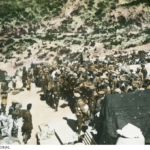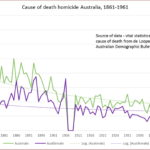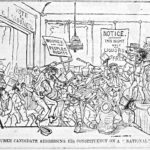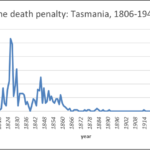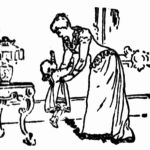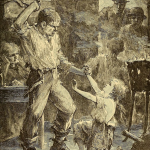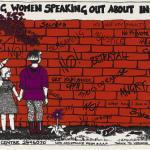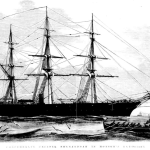Research Brief 34 From 1916 Anzac Day was commemorated to remember the fallen and honour those baptised by fire on the shores of Gallipoli. That same year the Australian army conducted at least 3,342 courts martial for military and civil infractions. The fighting spirit and resourcefulness of the Anzac has become legend. Soldiers who broke […]
Femicide: an intractable history*
Research Brief 33 The murders of Hannah Clarke and her three children at Camp Hill in February 2020 demonstrated once again the persistence of Australian experience of domestic violence. The very familiarity of the middle-class, suburban setting for the extreme violence of this killing has provoked a conversation about a pattern of intimate partner control […]
The day Paul Keating voted for Ronald M’Donald
Research Brief 32 Australians preparing to vote on Saturday 18 May have been reminded by Judith Brett in her recent book[1] how unusual the compulsory Australian ballot really is. Tracing the evolution of the modern Australian electoral system Brett shows why we vote on Saturday, why we vote with a pencil, why we vote in […]
Convict Micro-Histories Reveal Processes of British Colonisation
Research Brief 31 In October 1841, William Phelps Pickering became the first person sentenced to transportation from New Zealand. His seven year sentence was handed down at the first Quarter Sessions ever held in Auckland after Pickering was found guilty of fraud and misrepresentation. It was one thing for a New Zealand court to hand […]
The hanging years
Research Brief 30 As one of the two original Australian convict colonies, Tasmania shares with New South Wales an ignominious history of capital punishment in the first half century of settlement. The Prosecution Project has recently completed an inventory of executions carried out in Tasmania, beginning in the year 1806 and extending to the last […]
Why history shows we need lawyers
Research brief 29 Why do people need lawyers? This may sound like the start of a joke. Yet the need for lawyers remains a serious issue for anyone seeking protection of their constitutional rights, arbitration in civil disputes or a fair trial in criminal matters. Access to legal services has become a particularly serious question […]
The pretense of a prosecution?
Research Brief 28 In 1900, Mary Ryan was living at North Pine, near Brisbane, with her five children. Her husband had not lived at home with the family for some four or five years. Early on the morning of 4 February 1900, Mary gave birth to her sixth child, a boy. On 17th February 1900, […]
“Mum will be safe now”: Prosecuting children who kill violent men
Lisa Durnian examines patricide prosecutions where children killed their mothers’ abusers. Research Brief 27 – originally published as part of the Australian Women’s History Network’s 16 Days of Activism Against Gender Violence series. Domestic murders are perhaps the most distressing type of homicide, particularly when parents kill their children. But children also kill parents. In Australia about thirteen […]
Uncovering a hidden offence: Histories of familial sexual abuse
Andy Kaladelfos examines the historical ability of the criminal justice system to respond to sexual abuse within the family. Research Brief 26 – originally published as part of the Australian Women’s History Network’s 16 Days of Activism Against Gender Violence series. The sexual abuse of children is overwhelmingly perpetrated by people known to victims. National […]
A foreign fighter
Research Brief 25 Among the lighter sentences awarded to those convicted in the Victorian Supreme Court in the nineteenth century was that of ten days imprisonment handed down to James ‘Charley’ Davidson in March 1865. His offence, however, was more weighty, its context more global than local in significance. The pages of the Supreme Court […]

